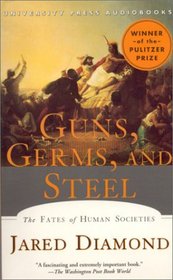Kent F. (kent) reviewed Guns, Germs, and Steel: The Fates of Human Societies on + 50 more book reviews
Helpful Score: 7
Read's like a doctoral thesis. So redundant that one wonders if the author was being paid by the word.
Helpful Score: 4
This is not the easiest read in the world, but definately offers fascinating material for thought.
Helpful Score: 4
Tremendous scholarly work. Ever wonder why some societies, such as African and South American, for example, have not "progressed" to the levels of others in economic and military terms? Ever suspect that the answer is innate intelligence? Diamond disproves this idea with resounding insight. His surprising answer to this question is basically "geography." That plus the lack of domesticatable animals and grains. The geography answer may be perplexing, until you consider that in Eurasia successful crops could be exported very widely with little latitudinal change. Not so in North-South land masses. (From a developmental standpoint, the US is largely European.)
It all boils down historically to the change in a society from hunter-gatherers (nomads) to agricultural (settled) civilizations. It is the latter that enables specialization of labor. When everyone is struggling to feed themselves and their families on a day to day basis, there is no luxury of allowing the rise of a craftsman class, a warrior class, etc., etc.
The great news from Diamond is that most of the old rules no longer apply in a modern "flat" world, so these natural obstacles to development in Africa, e.g., are in the process of being removed as economics allow.
It all boils down historically to the change in a society from hunter-gatherers (nomads) to agricultural (settled) civilizations. It is the latter that enables specialization of labor. When everyone is struggling to feed themselves and their families on a day to day basis, there is no luxury of allowing the rise of a craftsman class, a warrior class, etc., etc.
The great news from Diamond is that most of the old rules no longer apply in a modern "flat" world, so these natural obstacles to development in Africa, e.g., are in the process of being removed as economics allow.
Yuan W. (yuan) reviewed Guns, Germs, and Steel: The Fates of Human Societies on + 2 more book reviews
Helpful Score: 4
Interesting arguments, presented in a very clear and matter-of-fact way. Was not a fan of the prose however. Very dry, chapters did not really seem to flow together. Given such a gripping topic, would have expected a bit more page "turn-ability".
Helpful Score: 3
very interesting theories on causation in History. Takes some thinking but really interesting




